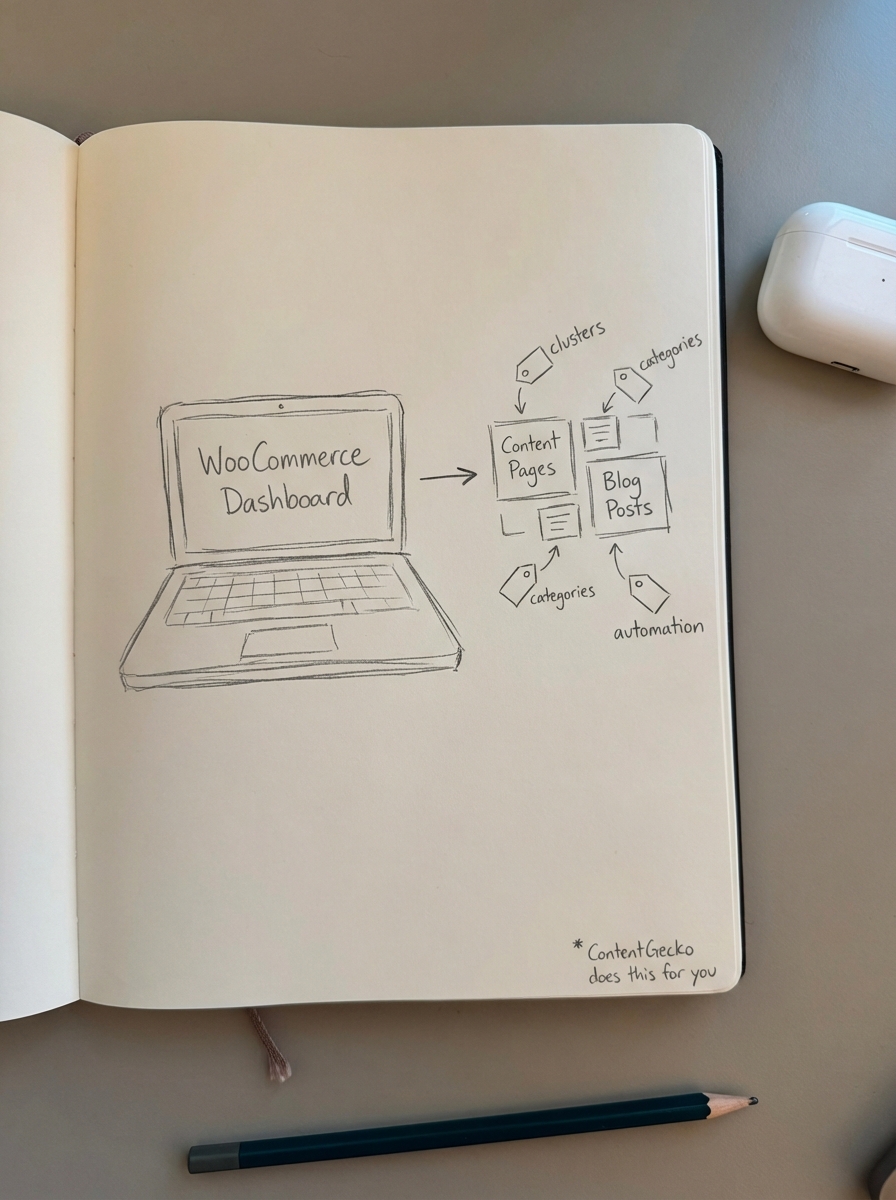How to automatically group keywords for SEO and PPC
Sorting a 5,000-line keyword export by hand is the fastest way to kill your search campaign’s ROI. Automated keyword clustering replaces days of manual pivot tables and “gut feel” sorting with a data-driven map of how search engines actually group intent.

If you are managing a WooCommerce store with hundreds of SKUs, you do not have time to debate whether “waterproof hiking boots” and “rain-resistant trekking footwear” belong on the same page. You need a system that looks at the Search Engine Results Page (SERP) to tell you if Google treats those as one intent or two. I’ve found that relying on automated clustering is the only way to scale without drowning in spreadsheets.
Why manual keyword grouping is a legacy workflow
I have spent years staring at spreadsheets, trying to build tightly themed ad groups for massive e-commerce catalogs. The manual approach is fundamentally flawed because it cannot handle the sheer scale of modern search. As your catalog grows, the permutations of long-tail keywords grow exponentially; a store with 1,000 products can easily generate 50,000 relevant search queries.
Beyond the volume, manual grouping is plagued by subjectivity. Two SEOs will often group the same list differently based on their personal interpretation of “meaning,” leading to inconsistent site structures. More importantly, linguistic similarity does not guarantee SERP similarity. Just because two words mean the same thing to a human doesn’t mean Google ranks the same results for them.
At ContentGecko, we operate on the belief that 3rd party keyword data is often imprecise. Databases are often too small to represent the true long-tail opportunity, but the SERP itself never lies. If two keywords share 70% of the same top-10 URLs, Google is explicitly telling you they belong on a single page. If they share zero overlap, you need two separate pages to avoid content cannibalization and ensure you are actually meeting the user’s intent.
![]()
SERP-based vs. semantic clustering: choosing the right method
When you automatically group keywords, you generally choose between semantic (NLP-based) and SERP-based methodologies. Both have their place, but they serve very different strategic goals.
Semantic clustering uses Natural Language Processing to group keywords by linguistic meaning. It is incredibly fast and cost-effective, which makes it useful for initial ideation or extremely large datasets. For example, a semantic tool will see “blue running shoes” and “azure sneakers for jogging” and group them because the words are related. However, semantic clustering can be unpredictable because it doesn’t account for how search engines actually behave in the wild.
SERP-based clustering is the gold standard for SEO. The tool fetches the top 10 results for every keyword in your list and compares the URL overlaps. This aligns your strategy with real-time search engine behavior. I always recommend SERP-based clustering for SEO because it tells you exactly what Google wants to see on a single URL, removing the guesswork from your content planning.
A practical workflow for WooCommerce content mapping
For WooCommerce managers, the goal of keyword grouping is to drive sales, not just organize data. I have found that optimizing category pages is significantly more important than focusing on individual product pages, as categories capture broader, high-intent traffic.
To turn a raw keyword dump into an actionable topic cluster strategy, I follow a specific automation-heavy workflow:
- Extract your existing data from Google Search Console and expand the list by performing a competitor keyword gap analysis.
- Upload your list to a dedicated keyword clustering tool and set an overlap threshold, typically requiring three or four shared URLs in the top 10.
- Label clusters by intent, such as Informational, Transactional, or Commercial, to determine the necessary page type.
- Align your clusters with your WooCommerce category structure and identify major content gaps where high-volume clusters lack a corresponding page.
- Filter for “low-hanging fruit” clusters where you currently rank in positions 8-20 using your ecommerce SEO dashboard to prioritize quick wins.
Optimizing PPC ad groups with automated clustering
PPC managers often fall into the “Broad Match” trap because building thousands of exact-match ad groups is too labor-intensive to do manually. Automated clustering solves this by creating tightly themed ad groups in seconds rather than hours.
By grouping keywords by SERP similarity, you ensure that the landing page you are sending traffic to actually matches what the searcher expects. This naturally increases your Quality Score, lowers your CPC, and improves your ROAS. I have seen this approach dramatically reduce “wasted spend” because it prevents you from bidding on two different keywords that Google considers to be the same intent, allowing you to consolidate your data and budget effectively.
Scaling beyond the spreadsheet with ContentGecko
While using a free keyword clustering tool is a great starting point for one-off projects, growing WooCommerce stores need a permanent, automated solution. Manually updating a blog to reflect stock changes or new long-tail keyword opportunities is an impossible task for any human team.
ContentGecko solves this by connecting directly to your store via our WordPress connector plugin. We do more than just cluster keywords; we use those clusters to plan a catalog-synced content calendar and automatically publish AI-optimized articles that update dynamically when prices or stock levels change.

If you believe that the real opportunity for growth lies in producing a great blog once the technical basics are handled, then automation is your only path to scale. It allows a small team to perform like an enterprise-level department by removing the friction of manual research and execution.
TL;DR
- Stop manual grouping because it is slow, subjective, and fails to account for how Google actually ranks pages in real-time.
- Use SERP-based clustering to ensure your topic clusters are aligned with actual search result overlaps and user intent.
- Prioritize categories over individual product pages when clustering, as these represent the highest ROI opportunity for most WooCommerce stores.
- Automate the execution by using tools like ContentGecko to turn keyword clusters into live, catalog-aware content that updates without manual intervention.
